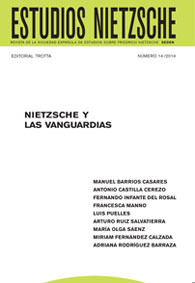The Elimination of Logical Sense in Art. De Chirico Reads Nietzsche
DOI:
https://doi.org/10.24310/EstudiosNIETen.vi14.10744Keywords:
Nietzsche, De Chirico, philosophy, paintingAbstract
The affinity between Nietzsche’s and De Chirico’s sensibility has been much commentary on by specialists in the work of the latter. The aim of this article is not to draw up an inventory of the remarks made in this sense, but to try to clarify the problem that, as it seems to us, all of them leave unsolved: why De Chririco, usually considered to be a pioneer of the Avant-Garde art movements, turned in the middle of the twenties of
last century against any form of modernity in art.
Downloads
Metrics
References
De Chirico, G., Sobre el arte metafísico y otros escritos, Colegio oficial de aparejadores y arquitectos técnicos, Murcia, 1990.
De Chirico, Giorgio, Memoria de mi vida, trad. S. Calvo, Madrid: Síntesis, 2004.
Deleuze, G., Nietzsche y la filosofía, trad. C. Artal, Anagrama, Barcelona, 1971. Nietzsche, F., Obras Completas, I-IV (OC ). Director ed. Diego Sánchez Meca. Madrid: Tecnos, 2011-2016.
Nietzsche, F., Correspondencia I-VI. (CO). Director ed. Luis E. de Santiago Guervós. Madrid : Trotta, 2005- 2012.
Nietzsche, F., Fragmentos Póstumos I-IV (FP). Director ed. Diego Sánchez Meca. Madrid: Tecnos, 2006-2010.
Volpi, F., El nihilismo, trad. C. I. Rosso y A. G. Vigo, Siruela, Madrid, 2007.
Downloads
Published
How to Cite
Issue
Section
License
As of issue 21 (2021) this journal is published only in open access (diamond route).
From that number 21, like the previous numbers published in NIETZSCHE STUDIES, they are subject to the Creative Commons Acknowledgment-NoComercia-ShareIgual 4.0 license, the full text of which can be consulted at <http://creativecommons.org/licenses/by-nc-sa/4.0 >
It is the responsibility of the authors to obtain the necessary permissions of the images that are subject to copyright.
This work is licensed under a Creative Commons Attribution-NonCommercial-ShareAlike 4.0 International License.
Copyright generates two different rights: moral rights and patrimonial rights that EJFB recognizes and respects. Moral rights are those relating to the recognition of the authorship. They are rights of a personal nature that are perpetual, inalienable, unseizable and imprescriptible as consequence of the indivisible union of the author and his/her work.
Patrimonial rights are those that can be derived from the reproduction, distribution, adaptation or communication of the work, among others.







11.png)
